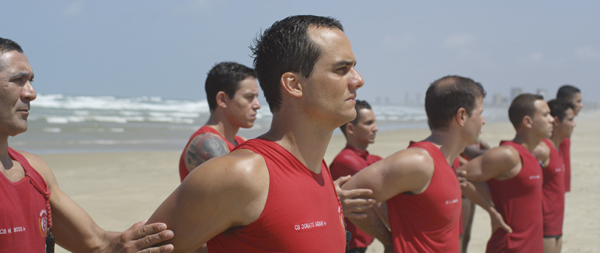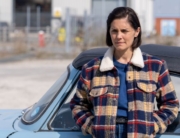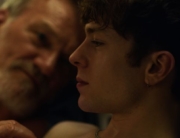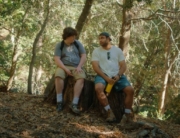Swathed in gleaming jewel tones and with a soundtrack of the pacifying acoustics of crashing waves, Futuro Beach opens like a travel guide video trumpeting the coastlines of Brazil. But the vibrant decor does not indefinitely endure, as director Karim Aïnouz (Madame Satä) tells a story of loss, longing, and love in three parts, two of which take place far from the idyllic South American seashore. While the film struggles to find its pace, its vivid parts come together to create a somber, sobering portrait of identity and responsibility.
In its opening sequence, two German ex-military motorcyclists traverse the hilly dunes of Futuro Beach, a picturesque coast with a treacherous shoreline. Both thrill-seekers dive into the rough waters, but only one resurfaces, saved by local lifeguard, Donato (Elysium’s Wagner Moura). Upon waking in the hospital, the surviving biker, Konrad (Clemens Schick from Casino Royale), is informed by Donato that his friend has not been found.
Despite the harrowing news, sparks fly between Donato and Konrad almost immediately. Aïnouz does not hold back from diving directly into the sexual proclivities of these two masculine men. Through their shared sense of loss—Donato’s hero’s guilt, Konrad’s failure to protect his friend—the bond between these broken boys grows quickly, if imperceptibly. Watching them fall for each other is breathtaking. But their mutual attraction possesses an outlining of inherent peril, not unlike the spectacularly hazardous scenery that surrounds them.
Aïnouz also introduces a seemingly innocuous third party, Donato’s rowdy 10-year-old brother, Ayrton (Savio Ygor Ramos). The boy dubs Donato “Aquaman,” an affectionate indicator of Ayrton’s undying idolization of his “superhero” big bro. In return, Ayrton deems himself “Speed Racer,” after jumping onto Konrad’s parked motorcycle and pretending to rev the engine. We also learn of the boy’s fear of the ocean, an anxiety that he would overcome only if Aquaman were to “one day vanish into the sea.”
The Donato-can-do-no-wrong structure, paired with foreshadowing metaphorical dialogue, is a bit obvious–is there any direction but downhill from here?–but the director manages to keep us immersed in the consequences of this setup by trading the tropical bliss of Brazilian beaches for the dreary, desolate streets of Berlin. Konrad returns to his motorcycle repair shop, and Donato, with no noted responsibilities in Brazil, drops everything to follow his paramour across the Atlantic.
Futuro Beach certainly adheres to its meandering, drawn-out style. At times, the inaction feels, oddly, a little forced. There are also moments and metaphors that are plainly banal. But despite its pacing and allegorical issues, the stunning cinematography, contrasting Brazilian and Berlin color palettes, and the powerful performances from Moura and Schick raise the sedate film above monotony. Aïnouz has directed a potent love story in whichever form the viewer seeks to fashion it—romantic love, brotherly love, love for one’s homeland, love for adventure—and by pairing that love with the things we leave behind, Futuro Beach reminds us that our futures are forever informed by our pasts.

















Leave A Comment